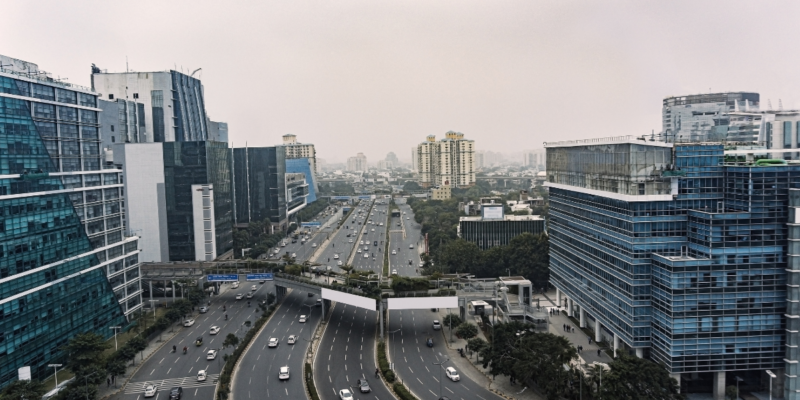Documents Required for Property Registration in Gurgaon, Haryana
March 24th, 2025

Know the key documents required for property registration in Gurgaon, Haryana. Learn the essential steps and legal requirements – including sale deed, tax receipt, encumbrance certificate, and more.
Property registration is essential for safeguarding your investment and ensuring a legally valid property transaction. You can achieve a smooth Gurgaon property registration process, by preparing the necessary documents such as property tax receipt, encumbrance certificate, sale deed registration Gurgaon, and more. Proper documentation confirms the legitimacy of the transaction and secures your rights as a property owner.
Table of Contents
Why Property Registration is Important
This is a fundamental step that provides indisputable legal proof of ownership and affirms your property rights. Gurgaon property registration process establishes a recorded and verifiable transaction that protects both buyer and seller, thereby preventing any future legal disputes.
Moreover, completing the necessary documents for property registration ensures that all legal formalities are met and your property transaction remains secure. By obtaining property registration documents Gurgaon, you can create a clear, government-sanctioned record that safeguards your investment and offers you long-term peace of mind.
Key Documents for Property Registration
The foundation of successful property registration lies in assembling the correct documentation. In this section, you will learn about the essential proofs that are crucial to validate your transaction. Having these readily available ensures that your Gurgaon property registration process proceeds without unnecessary delays.
- Identity Proof of Buyer and Seller: As part of the documents for property registration, ensure that you include valid PAN Card / Aadhar Card / Passport / Voter ID. These are some of the most important property registration documents Gurgaon.
- Address Proof: To establish a confirmed residential address, provide documents like utility bills, passport, or bank statements. These help streamline the Gurgaon property registration process by verifying your address correctly.
- Photographs: Including passport-sized photos of both buyer and seller in your property registration documents Gurgaon can ensure clear and accurate visual identification for official records.
Read More: Surging Demand in NCR Housing Market
Property-specific Documents
In this section, you will find details about key property-specific papers that substantiate ownership and legal clearances – such as sale deed, title deed, encumbrance certificate, and more. These papers form the backbone of a transparent and legally sound transaction in Gurgaon.
- Sale Deed: A registered sale deed is crucial for the transfer of ownership. It clearly outlines the terms of sale, and is indispensable for a valid transaction.
- Title Deed: This serves as the definitive proof of ownership from the seller. This document verifies that the seller holds legal title to the property, which is a critical part of your property registration documents Gurgaon.
- Encumbrance Certificate: EC provides assurance that there are no outstanding legal dues on the property. It is an essential element while preparing the documents for property registration, ensuring that the property is free from any encumbrances.
- NOC from Society or Developer (if applicable): This document confirms that there are no objections to the transfer, facilitating a smooth process.
- Property Tax Receipts: These confirm the clearance of property taxes for the last few years. They form an integral part of property registration documents Gurgaon, verifying that all tax obligations have been met.
Additional Documents
Certain situations may require extra documentation to complete your registration smoothly. This section outlines documents such as Power of Attorney and Agreement to Sell – which are needed when someone is signing on your behalf, or when the property is sold through an initial agreement. These additional papers help fortify the legal framework of your transaction.
- Power of Attorney (if applicable): When a representative is authorised to act on your behalf, obtaining PoA for property registration is imperative. This document legally empowers the appointed individual to manage the transaction on your behalf, ensuring the Gurgaon property registration process is executed efficiently.
- Agreement to Sell (if applicable): In cases where the sale is initiated with an agreement prior to executing the final sale deed, the Agreement to Sell is essential. This document delineates the terms and conditions of the sale, contributing to a transparent transfer of property ownership.
Process of Document Submission
The systematic process ensures all required documents are submitted, verified and the associated fees are paid. This approach secures a legally valid property transaction and ensures that you have all the necessary documentation in place, such as title deed and sale deed registration Gurgaon.
- Visit the Sub-registrar’s Office to submit your property registration documents
- If available, utilise the online property registration Gurgaon facility to upload your documents and monitor your application status
- Undergo a thorough verification process where each document – including the sale deed and title deed – is scrutinised for accuracy and compliance
- Pay the registration charges based on the property value, ensuring you meet the guidelines for property registration fees Haryana
- Settle the stamp duty specific to Gurgaon as a percentage of the property’s value, finalising the legal requirements for the transaction
Read More: Why Sector 106 is the Best Place to Live in Gurgaon
Fees Associated with Property Registration
Completing the registration process entails understanding and paying the necessary fees. This section provides insights into the registration charges based on the property value, and outlines the stamp duty specific to Gurgaon. Being aware of these fees will help you budget accordingly and avoid unexpected expenses during your transaction.
- Registration Charges: These are calculated based on the property value, circle rate, and other factors specified by the authorities. These charges form an integral part of the overall property registration fees Haryana, ensuring that the transaction is processed legally.
- Stamp Duty: Stamp duty Gurgaon property is applicable as a percentage of the property’s value (or market value, whichever is higher) – and is a key component of the financial requirements for the transaction. This duty must be paid at the time of registration to complete the legal transfer of ownership, as per the guidelines set out in Haryana property registration procedure.
Common Mistakes to Avoid During Property Registration
While preparing for your property registration in Gurgaon, it is essential to remain vigilant against common errors that could compromise the process. A careful review of your documentation and records prevents delays and legal complications.
- Submitting incomplete or incorrect documentation, which can delay your property registration process
- Failing to verify the authenticity of documents, such as title deed or sale deed registration Gurgaon, leading to potential legal complications
- Not checking the property tax records or not ensuring that you have the proper property tax receipt Gurgaon, which may result in future disputes
Conclusion
Secure your property registration by following the process described in this blog, that includes complete, verified documentation and adherence to legal and financial requirements. Avoid common pitfalls by ensuring that your documents for property registration are accurate and authentic. By doing so, you can safeguard your investment and ensure smooth transition of property ownership through the Gurgaon property registration process.
FAQs
1. What documents are required for property registration in Gurgaon?
Documents required for property registration in Gurgaon include identity and address proofs, passport-sized photographs, sale deed, title deed, encumbrance certificate, NOC from the housing society or developer (if applicable), property tax receipts, and additional documents such as Power of Attorney or Agreement to Sell if needed.
2. Do I need to submit Encumbrance Certificate for property registration?
Yes, you need to submit Encumbrance Certificate for property registration, as it verifies that the property is free from legal dues – ensuring clear transfer of ownership during the registration process.
3. What is the role of Sale Deed in property registration?
Sale Deed plays a crucial role in property registration by legally transferring ownership from seller to buyer, and outlining the terms and conditions of the transaction.
4. Can I register a property without NOC from the housing society or developer?
You cannot register a property without NOC from the housing society or developer.
5. Is Power of Attorney necessary for property registration?
Power of Attorney is necessary for property registration only if a representative is signing on behalf of the buyer or seller. PoA authorises the representative to complete the registration process.
6. What is the stamp duty rate for property registration in Gurgaon?
Stamp duty rate for property registration in Gurgaon is 7% for male homeowners and 5% for female homeowners; and it is determined as a percentage of the property value according to the guidelines set by Haryana state government, varying with the specifics of each transaction.
7. Can property registration be done online in Gurgaon?
Property registration can be done online in Gurgaon, on the Jamabandi portal at https://jamabandi.nic.in/DefaultPages/Default but you would still need to visit the Sub-registrar’s Office in Gurgaon for personal verification and process completion.
8. How long does the property registration process take in Gurgaon?
Property registration process may take a few weeks in Gurgaon, though the exact timeframe depends on the efficiency of document verification and administrative procedures.
9. What are the consequences of not registering a property?
Consequences of not registering a property include the absence of legal proof of ownership, exposure to potential legal disputes, and complications in future property transactions.
10. Are there any penalties for late property registration in Gurgaon?
Yes, there are penalties for late property registration in Gurgaon, such as fines and additional charges as prescribed by state regulations – emphasising the importance of timely completion of the registration process.








